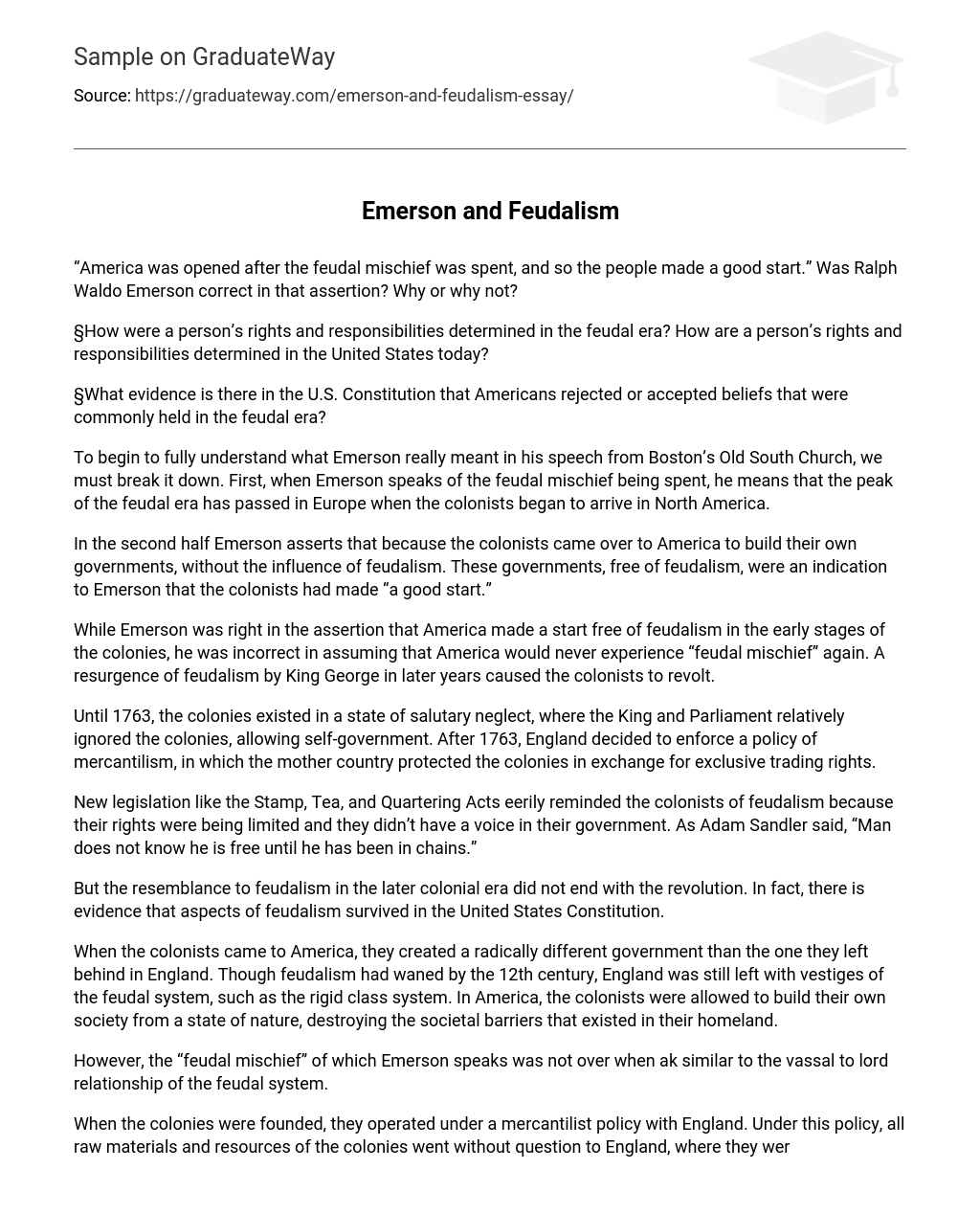America was opened after the feudal mischief was spent, and so the people made a good start. Was Ralph Waldo Emerson correct in that assertion? Why or why not? How were a person’s rights and responsibilities determined in the feudal era? How are a person’s rights and responsibilities determined in the United States today? What evidence is there in the U.S. Constitution that Americans rejected or accepted beliefs that were commonly held in the feudal era?
To begin to fully understand what Emerson really meant in his speech from Boston’s Old South Church, we must break it down. First, when Emerson speaks of the feudal mischief being spent, he means that the peak of the feudal era has passed in Europe when the colonists began to arrive in North America.
In the second half Emerson asserts that because the colonists came over to America to build their own governments, without the influence of feudalism. These governments, free of feudalism, were an indication to Emerson that the colonists had made “a good start.”
While Emerson was right in the assertion that America made a start free of feudalism in the early stages of the colonies, he was incorrect in assuming that America would never experience “feudal mischief” again. A resurgence of feudalism by King George in later years caused the colonists to revolt.
Until 1763, the colonies existed in a state of salutary neglect, where the King and Parliament relatively ignored the colonies, allowing self-government. After 1763, England decided to enforce a policy of mercantilism, in which the mother country protected the colonies in exchange for exclusive trading rights.
New legislation like the Stamp, Tea, and Quartering Acts eerily reminded the colonists of feudalism because their rights were being limited and they didn’t have a voice in their government. As Adam Sandler said, “Man does not know he is free until he has been in chains.” But the resemblance to feudalism in the later colonial era did not end with the revolution. In fact, there is evidence that aspects of feudalism survived in the United States Constitution.
When the colonists came to America, they created a radically different government than the one they left behind in England. Though feudalism had waned by the 12th century, England was still left with vestiges of the feudal system, such as the rigid class system. In America, the colonists were allowed to build their own society from a state of nature, destroying the societal barriers that existed in their homeland.
However, the “feudal mischief” of which Emerson speaks was not over when ak similar to the vassal to lord relationship of the feudal system. When the colonies were founded, they operated under a mercantilist policy with England. Under this policy, all raw materials and resources of the colonies went without question to England, where they were manufactured into goods and sent back to the colonies. The colonists had no representation in England, and England had supreme power over the colonies and also had the duty of protecting those colonies from attack. This is nearly identical to the feudal system.
However, England abandoned the practice of feudalism during the reign of King George, who followed a policy of salutary neglect. During this time the colonies were left to govern themselves. Then with the Proclamation of 1763, the king reasserted his feudal power over the colonists by restricting them to the land east of the Appalachian Mountains. This was followed by other laws that took away the powers that the colonists were used to having, such as the Intolerable Acts and the suspension of habeas corpus.
This resurgence of feudal power caused the colonists, who had been practicing self-government, to rebel against England. Therefore, in a way the existence of feudalism caused America to be its own nation. The problem of feudalism was that it took away too many of the colonists rights.
In the feudal system, the rights and responsibilities of the peasants and lords are clearly laid out. Similar to the early mercantilist system of the colonies, the peasants in a feudal system are required to serve their lord in a militia, and they are required to pay tribute to their lord. In England, this tribute was usually paid with the best of a peasant’s crops. The peasant consents to being governed by the lord, who in turn has absolute power over the peasants, but also the duty to protect their peasants’ lives.
The American system of government differs greatly from the concept of feudalism in that the citizens of the nation have many more individual rights than the peasants of the feudal system. The Founders of the United States Constitution emphasized these individual rights, especially the natural rights to life, liberty, and property, because England attempted to take these rights away before the American Revolution.





